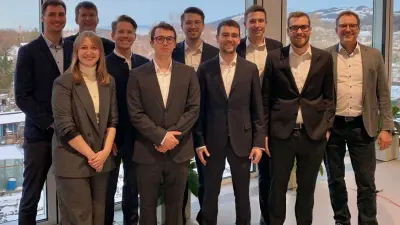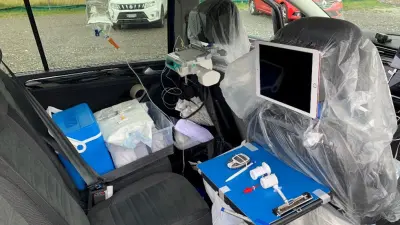Ten Years of Bosch IoT Lab: Our Think Tank for Digital Business Models
Founded when the Internet of Things was still an unexplored world

The Bosch IoT Lab is celebrating its 10th anniversary this year. The Lab is a collaboration between Bosch and two renowned Swiss universities: the University of St. Gallen and the Swiss Federal Institute of Technology Zurich, known as ETH. The University of St. Gallen is considered one of the best business schools in Europe, while ETH is a breeding ground for professionals in engineering and natural sciences.
When the IoT Lab was founded in 2013, its core objective was to show the Bosch workforce the business opportunities and business models of the IoT world and to generate enthusiasm for this new world through concrete technical demonstrators. “In the meantime, the Lab has become a kind of think tank for digital business in the Group and is available to Bosch specialists and executives as an advisor and sparring partner,” says Wolfgang Bronner, who runs the IoT Lab together with Felix Wortmann, professor at the University of St. Gallen and Scientific Director. “Together with the Corporate Digital Office and the Corporate Strategy division of Bosch, Bosch Research supports the IoT Lab due to numerous research interfaces in terms of content. In addition, there are the IoT Lab's strong networks in the university research landscape and industry. In addition to concrete research work, the Lab advises various Bosch divisions on economic business strategies for scaling digital products and services,” explains Thomas Kropf, President Corporate Sector Research and Advance Engineering of Robert Bosch GmbH.
Discovering and researching new opportunities
Ten years ago, business models were primarily hardware-driven. However, it became apparent that major changes were on the horizon. Experts predicted that within a few years, the interplay of hardware, software, and digital services would enable completely new intelligent, interconnected solutions. So, it was time to scientifically investigate these topics in the newly founded IoT Lab, whose team conducts research at the two locations in St. Gallen and Zurich in Switzerland. In addition to the leadership duo of Wolfgang Bronner and Felix Wortmann, five doctoral students currently work for the Lab, along with several master's students. Publicly funded projects with additional doctoral students complement the tasks and capacities.
Accompanying and initiating dozens of projects
Over the course of its ten-year work, the Bosch IoT Lab has accompanied and initiated dozens of research and development projects and continues to initiate projects itself — especially in strategically important areas for Bosch. In 2019, a long-term project was launched at the intersection of health and mobility, which aims to detect and prevent dangerous hypoglycemia in diabetics and to detect and prevent drunkenness and drug influence while driving. Data from the vehicle is evaluated — while considering data protection. A "Fit to Drive" algorithm detects critical eye or steering behavior and warns the driver.

Research criterion: IoT projects must be economically viable
Currently, the Bosch IoT Lab is focusing on two strategic areas: on the one hand, to research and develop promising IoT products and services in consultation with individual Bosch business areas. On the other hand, in recent years, concrete business models and the question of how industrial companies can make money with the Internet of Things have come into focus. Searching for innovations also means that ideas may turn out to be less promising than originally thought. According to the scientific director Felix Wortmann, "From research, we know that most innovation projects fail. We have also had these experiences in the IoT Lab. But often, we create value just by doing so." Because if the research suggests that an investment is not worthwhile, the partner can avoid a costly failure at best. Often, however, the commitment and persistence of the researchers pay off — as evidenced by the awards that the lab has received. It received the Impact Award from the University of St. Gallen twice, which honors local research projects that have a particularly significant impact on the economy and society.